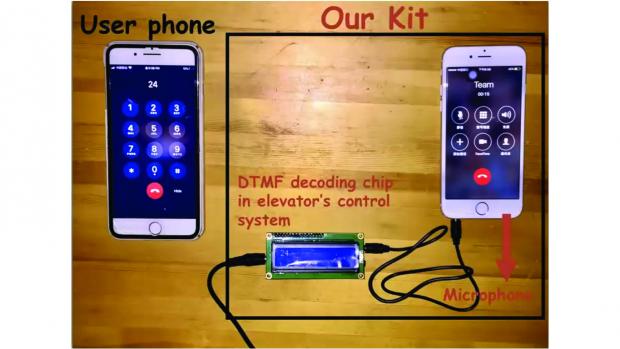Meeting the challenge
Incoming students shine at the NYU Tandon Made Challenge

The winning undergraduate project in the Tandon Made Challenge: A device that will allow an elevator passenger to indicate their desired floor without touching a button, via an installed DTMF decoder that receives and filters frequencies created by their own phone.
If you were going to embark on a demanding engineering program in the fall, certainly no one would blame you for spending the summer simply relaxing. Yet when incoming students were invited to participate in the NYU Tandon School of Engineering’s 2020 Tandon Made Challenge, which called upon them to team with their future classmates to solve a pressing healthcare challenge in a post COVID-19 world, more than 150 eagerly agreed.
The first of three challenges charged students with finding ways to retrofit existing hardware so that it could be used without human contact — thereby limiting the spread of COVID-19 and other viruses — they came up dozens of innovative modifications, from self-cleaning escalator handrails to no-touch vending machines and parking meters.
Teams were mentored along the way by NYU Tandon teaching assistants, faculty members, and industry experts, who guided them in brainstorming their proposed products, researching competing products, considering factors like cost and scalability, and more.
There was prize money at stake: after a pitch session, conducted via Zoom, two teams (one undergraduate and one graduate) were tapped to receive $5,000 each to develop and build their prototype in the fall, with the ultimate goal being to create a viable, market-ready product.
The winning graduate team was comprised of Jasmine Panesar (M.S. in Biotechnology and Entrepreneurship), Kelechi Ndukwe-Ajala (Ph.D. in Chemical Engineering), Tiffanie Liang (M.S. in Environmental Science), and Neta Benor (M.S. in Biotechnology and Entrepreneurship). Their product, Extend-O-Guard, is an elastic, polymer-coated, flexible spring band that consumers can use to cover the handle of shopping carts, rented bikes, and other such items, thereby reducing the spread of bacteria and germs. Stored inside a small, travel-sized case containing a sanitizing solution, Extend-O-Guard impressed judges (Professors Kurt Becker, Rumi Chunara, Elza Erkip, Vikram Kapila, and John-Ross Rizzo) with its simplicity and effectiveness.
The winning undergraduate project was a Dual Tone Multi-Frequency (DTMF)-Controlled Zero Contact Buttons Kit for use in elevators. Developed by incoming bachelor’s-degree students Christine Wang (Integrated Digital Media), JinJing Luo (Business and Technology Management), Suning Yao (Math), and Zheqing Yang (Business and Technology Management), the kit will allow an elevator passenger to indicate their desired floor without touching a button, via an installed DTMF decoder that receives and filters frequencies created by their own phone. (In the fall, they hope to use NYU elevators as test-beds.)
Those projects were chosen from an especially strong field of finalists that included:
- AutoKlean (by incoming undergraduates Sasha Kucher and Phin Ariyaphuttarat), a system that sanitizes escalator handrails using a combination of disinfectant solution and UV light.
- The Holographic Keypad (by incoming undergraduates Caleb Hao, Lamia Tahsin, Dorothy Zhang, Ahmer Khan, Ehtisham Chaudhary, and Ryan Rochmanofenna), a touchless ATM input system consisting of an LCD paired with chemically treated glass that projects a virtual keypad and an infrared-based optical sensor, placed above the projected image to relay user input.
- Swive: Safe Wireless Vending (by incoming graduate students Kartik Saxena, Aditya Chawla, Aayushi Sikligar, Kunwar Srivastav, and Aagam Shah), an IoT device that can be installed on most vending machines through a universal port to facilitate payments through an accompanying mobile/web application.
- Hyoumid (by incoming graduate students Nicole Allegretti, Som Liengtiraphan, Janelle Roswell, and Anurag Rathore), a unit that will help maintain a relative humidity level of 50% or greater on public trains, buses, and subways, thereby reducing the survival of airborne viruses in those enclosed spaces by up to 30%.
“Even if they were not declared finalists, all students displayed an understanding of the problem faced in a post COVID-19 world and the necessity of unique engineering solutions to solve them, and all this while few, if any, of them had prior product development and startup experience,” said Steven Kuyan, Director of Entrepreneurship at NYU Tandon. “Their commitment to this challenge and future challenges is encouraging us to build support structures to help all the teams that choose to pursue their ideas in the coming semester, and if what we saw here is any indication, the Class of 2024 is going to be a dynamic, engaged group of innovators.”
Teams are now forming for the Telecommunication, Telehealth and Teletherapy enabled by Communications (5G) Challenge, which begins on June 22 and will require participants to use 5G and other wireless technologies to provide remote diagnostics, patient support, and treatment, ushering in the next generation in healthcare. Mentors will include Jerry Brager, the Chairman and CEO of 1-800-Doctors and Harrison Lung, a partner at McKinsey & Company specializing in business, technology strategy, and wireless communications.




